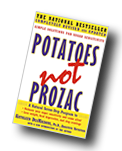Looking at Alcoholism and Other Addictions
 The history of the book Potatoes Not Prozac and Radiant Recovery® is found in Kathleen’s personal journey and her work in the alcohol and drug treatment center she started in 1988 in Northern California. She was disturbed by the inadequacy of treatment at that time and started to explore the impact of changing what and when people ate as part of the protocol. The results were so dramatic, she made the decision to return to school for a Ph.D. to explore “why” changing food affected treatment success so much.
The history of the book Potatoes Not Prozac and Radiant Recovery® is found in Kathleen’s personal journey and her work in the alcohol and drug treatment center she started in 1988 in Northern California. She was disturbed by the inadequacy of treatment at that time and started to explore the impact of changing what and when people ate as part of the protocol. The results were so dramatic, she made the decision to return to school for a Ph.D. to explore “why” changing food affected treatment success so much.
She theorized that people who were vulnerable to alcoholism (and drug addiction) had a unique biochemistry that predisposed them to it. This had actually been suggested in the original Dr.’s opinion in the Big Book of AA which described an “allergy” to alcohol. Kathleen thought it was something more than allergy. She coined the idea of “sugar sensitivity” and wrote a doctoral thesis on the topic.
Let’s take a look at some history and then look at whether you might have a problem. Here is a quote from her thesis:
Sugar Sensitivity as a Risk Factor for Alcoholism
The author believes that genetically determined sugar sensitivity may be a critical factor in the etiology of alcoholism. Williams (1966) suggested this possibility: “While this impairment of glucose metabolism could be ascribed entirely to the effects of alcohol consumption…the animals may have had it before they had any contact with alcohol.”
There is research evidence to support Williams’ idea that this disturbance in metabolic functioning precedes alcoholism rather than being a consequence of it. Overstreet (1993) shows that the consumption levels of a sweet tasting drink predict alcohol intake in genetically heterogeneous rats. Goas (1978) suggests that alcohol-preferring (C57BL6) mice are born with a difference in their metabolic response to sugar intake and that the reaction to carbohydrate (sugars and starch) is genetically determined. While remaining alcohol naive (i.e., they had never consumed any alcohol), the C57BL6 mice had higher levels of both blood glucose and insulin than the mice from a strain adverse to alcohol. This pronounced rise in glucose evokes a dramatic rise in insulin and subsequent drop in blood sugar, resulting in hypoglycemia. Rats genetically bred to prefer alcohol over water have a distinctly differing response in glucose formation than do than rats bred to have an adverse reaction to alcohol (Forsander, 1987).
Goas (1978) suggests that alcohol-preferring (C57BL6) mice are born with a difference in their metabolic response to sugar intake and that the reaction to carbohydrate (sugars and starch) is genetically determined. While remaining alcohol naive (i.e., they had never consumed any alcohol), the C57BL6 mice had higher levels of both blood glucose and insulin than the mice from a strain adverse to alcohol. This pronounced rise in glucose evokes a dramatic rise in insulin and subsequent drop in blood sugar, resulting in hypoglycemia. Rats genetically bred to prefer alcohol over water have a distinctly differing response in glucose formation than do than rats bred to have an adverse reaction to alcohol (Forsander, 1987).  Alcohol-preferring rats synthesize glucose from non-carbohydrate sources (gluconeogenesis) at a slower rate than do alcohol avoiding rats. Alcohol avoiding rats had minimal change in glucose formation when they were given alcohol. The synthesis of glucose by the alcohol-preferring rats almost doubled with the introduction of alcohol. Alcohol had no effect on the hepatic glycogen level of alcohol-preferring rats but decreased the level in alcohol avoiding rats. Carbohydrate turnover is severely disturbed by alcohol. (Forsander, 1987).
Alcohol-preferring rats synthesize glucose from non-carbohydrate sources (gluconeogenesis) at a slower rate than do alcohol avoiding rats. Alcohol avoiding rats had minimal change in glucose formation when they were given alcohol. The synthesis of glucose by the alcohol-preferring rats almost doubled with the introduction of alcohol. Alcohol had no effect on the hepatic glycogen level of alcohol-preferring rats but decreased the level in alcohol avoiding rats. Carbohydrate turnover is severely disturbed by alcohol. (Forsander, 1987).
In essence, this means if you are sugar sensitive, you are vulnerable to alcoholism and drug addiction. It is not a moral issue, it does not mean you have a weak will, it ONLY means that you were born with a biochemistry that meant you feel pain more deeply and that you have sought ways to deal with it.
Let’s start with looking at whether you have a problem and how serious it might be. Here are some questions to get you started:
I have some concern about my alcohol use.
Ask yourself these 4 questions:
Have you ever felt you needed to Cut down on your drinking?
Have people Annoyed you by criticizing your drinking?
Have you ever felt Guilty about drinking?
Have you ever felt you needed a drink first thing in the morning (Eye-opener) to steady your nerves or to get rid of a hangover?
Ok, so if you answered yes to any of these questions, chances are you have a problem. No guilt, it is just that people who don’t have a problem, answer no to these questions. The nice thing is you are in exactly the right place because we know what to do.
I am pretty sure I have a problem but wonder what level.
 I know I have a problem and want to do something about it.
I know I have a problem and want to do something about it.
I am in recovery and want to go further.
I am starting a detox, what should I do?
I have less than one year of sobriety.
I have between 1 and 10 years of sobriety.
I have more than 10 years of sobriety.
I am building these pages and will add more shortly. If you find this and the links are not up yet, email Kathleen at kathleen@radiantrecovery.com and she will get back to you to talk. There is no charge for this.
